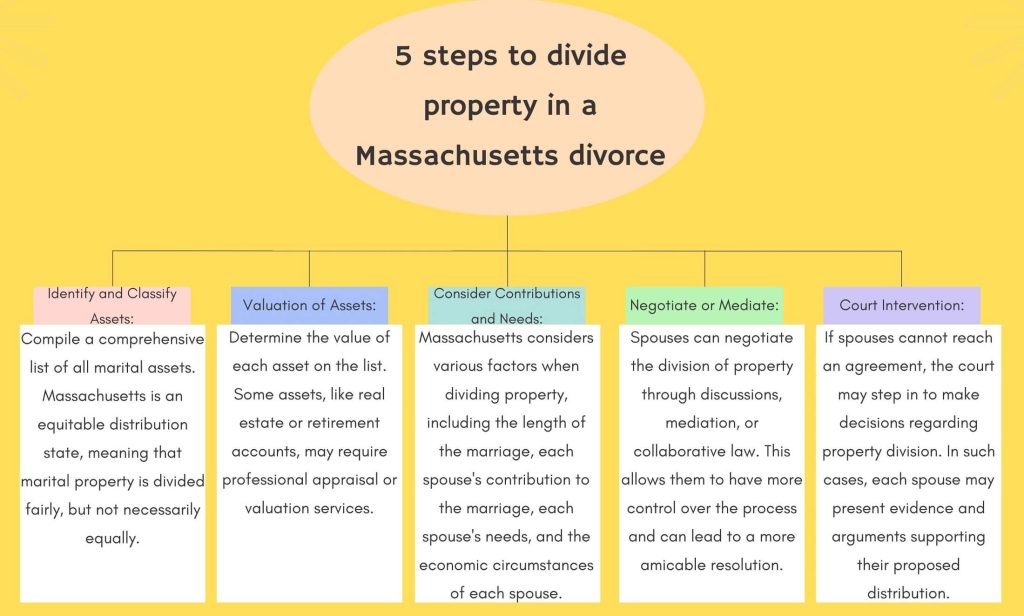MA divorce laws, particularly General Laws c.208, include the basic terms and rules that guide the divorce process in the state. Spouses who have decided to end their marriage should have at least a basic understanding of the state legal requirements to go through the divorce in Massachusetts effectively and without extra stress.
Table of Contents
ToggleIs Massachusetts a No-Fault Divorce State?
Massachusetts is a mixed divorce state since spouses can initiate a marriage dissolution on both fault and no-fault grounds. Previously, the state used to follow a solely fault-based divorce system. Parties seeking to terminate their marriage were required to provide evidence of wrongdoing by either spouse, such as adultery or cruelty, to establish grounds for divorce.
In the 1970s, significant legal reforms were introduced to simplify the divorce process and provide parties with a more efficient and less adversarial means of ending their marriages.
The no-fault Massachusetts divorce process allows couples to obtain a marriage dissolution without assigning blame or proving wrongdoing by either party. Instead of focusing on fault, the emphasis is placed on the irretrievable breakdown of the marriage.
No-fault divorce in Massachusetts offers several advantages:
- It minimizes conflict and emotional distress for spouses.
- It is often characterized by a more streamlined legal process, given it is uncontested, reducing the time, expenses, and complexity of the case.
The Grounds for Divorce in Massachusetts

According to Massachusetts divorce laws, couples can apply for divorce on no-fault or fault-based grounds. No-fault divorce, based on an irretrievable breakdown of the marriage, allows spouses to dissolve their union without proving blame of either party. On the other hand, getting a divorce in Massachusetts on fault-based reasons requires evidence of the spouse’s misconduct.
No-Fault Grounds
The only no-fault ground in the state is the marriage irretrievable breakdown. Two options are possible in a no-fault divorce, known as “1A” and “1B”, as specified in M.G.L. c. 208.
1A divorce is initiated when both spouses acknowledge that the marriage has irreparably broken down and cannot be sustained any longer. Furthermore, they should draft a written agreement on child-related issues, spousal support, and the equitable distribution of marital assets. It means the divorce is uncontested.
1B divorce is filed when only one party believes the marriage cannot be saved or both spouses think so but cannot agree on the marriage dissolution terms, meaning the case is contested.

Fault-Based Grounds
According to the M.G.L. c. 208, sec. 1, the fault-based grounds for divorce are:
- Adultery, or engaging in voluntary sexual intercourse with someone other than one’s spouse. One party should be able to prove that the other spouse engaged in adulterous conduct since mere suspicion or allegations are insufficient. Solid evidence is required to establish the spouse’s infidelity.
- Cruelty. It involves physical, verbal, or emotional abuse that poses a significant risk to one’s mental or physical health. Courts consider the severity and effect of the abusive conduct when determining if it warrants a divorce.
- Desertion or abandonment. One spouse leaves the marital home without the intent to come back. To become a grounds for divorce, desertion must have lasted at least one year before filing.
- Imprisonment. If one spouse has been sentenced to a prison term of at least five years, it is a legal reason for the other party to start a divorce case.
- Gross and confirmed habits of intoxication. It means that one spouse excessively consumes alcohol or other drugs, making marital life unbearable.
- Non-support. One spouse neglects their obligation to financially support the other party.
- Impotence. Physical inability to engage in sexual intercourse is a legal divorce ground.
Massachusetts Residency Requirements for Divorce

Couples seeking a divorce must fulfill the Massachusetts residency requirements, which mandate that:
- A petitioner resided in Massachusetts for a period of one year before initiating the divorce proceedings.
- A married couple lived together in Massachusetts, and the reason for the divorce happened here.
How to File for Divorce in Massachusetts
To get an uncontested divorce in Massachusets, or 1A divorce, without involving a lawyer, you may follow the steps as described below:
- Find the specific forms required for your case and fill them out. Carefully review each document to ensure the information specified is correct. Sign and date the papers and prepare copies of each form. Draft a separation agreement between you and your spouse, deciding on critical divorce-related matters such as child custody and support, distribution of property, alimony, etc.
- File papers with the court. You can do so by visiting the court in person, sending documents by mail, or submitting them through eFileMA. When filing for divorce in MA, pay the mandatory court fees of $215 or apply for a fee waiver if you are eligible. Since you file a Joint Petition for Divorce, there is no need to serve the other party.
- Attend a hearing. The court will send you a notification about the hearing date. Usually, both spouses should be present unless you requested a waiver of attendance before. The judge will check all the papers, consider the separation agreement, and approve it if everything is in order.
- Get your divorce finalized. After the judge approves the agreement, the judgment will be automatically entered in 30 days. After 90 days from that moment, also known as the nisi period, the case will be finalized, and you will be able to get a copy of the divorce decree.
What Is the First Step in Massachusetts Divorce?

The first step of any divorce process is preparing the case-specific paperwork, including a Joint Petition for Divorce or Complaint for Divorce, Separation Agreement, Financial Statements, Affidavit of Irretrievable Breakdown, Record of Absolute Divorce, etc.
There are several options on how to prepare the necessary documents.
- You can find all the required forms yourself on the official court websites and fill them out without any third-party help. However, please note that it can take quite a time. Besides, any mistakes or omissions in paperwork may lead to court rejection, so you will need to redo your documents.
- Alternatively, you can hire a lawyer who will collect the needed forms and complete them for you. Though convenient, the costs of such help can be pretty high, considering average lawyers’ hourly fees of $250-$400 per hour of work.
- One more option is to turn to an online service that can efficiently and affordably prepare the required Massachusetts divorce paperwork for your uncontested case within a short timeframe. We will ensure the forms are court-approved, up-to-date, and prepared for your specific case.
Where to File Your Divorce Case?
You should file for divorce in the Probate and Family Court in the county where you last lived together as a married couple if either party still resides there. If neither of you lives in that county, submit your documents to the court in the area where you or your spouse currently resides.
In addition to filing in person, it is possible to send documents by mail or upload them through the eFiling system. However, please check in advance if this option will work in your particular case.
The Filing Fees for Divorce in MA

When submitting papers to the court, spouses should cover mandatory court fees of $215, including a filing fee of $200 and a surcharge of $15. Additionally, couples will be required to pay for summons and citations, if applicable.
If you don’t have the financial means to pay filing fees, there is a way to request the court to waive them. You can do so by filling out the Affidavit of Indigency Form, specifying whether you receive any public assistance and providing detailed information on income. If the court finds the waiver request valid, you will be allowed not to cover the fees.
How Much Does a Divorce Cost in Massachusetts?
The cost of divorce in MA can be from $500-$1,000 to $12,000 or more. The main factors influencing the price are the type of the case – contested or not, its complexity, legal help required, etc.
If your divorce is contested, meaning you cannot agree with your spouse on child-related issues, property division, alimony, etc., you may need to pay somewhere between $8,000 and $15,000. A significant part of this amount would be attorney’s fees. In contested cases, hiring an attorney is often a necessity.
In an uncontested divorce, prices may start from mandatory court fees if you deal with the case completely on your own and reach several thousand dollars if you decide to involve an attorney. Ordering paperwork from an online service can cost you a moderate $140-$200, on average.
How Long Does a Divorce Take?

The divorce process can take from 4-6 months to a year or even longer, depending on whether the case is contested or not. 1A divorce lasts minimum 120 days due to:
- the 30-day period from the moment a judge approves the agreement till a judgment is entered,
- the 90-day nisi period from the judgment date till the case is considered final.
The timelines within which the court can start reviewing the case will mostly depend on the court’s workload.
In 1B or fault-based divorce, the final hearing on the case usually cannot be scheduled in less than 6 months from the moment you filed your papers with the court unless there is a court waiver. There may be pre-trial hearings. After the judgment on the case is entered, the divorce can be finalized in 90 days, after a mandatory nisi period is over.
Is Massachusetts a Community Property State?
Massachusetts is not a community property state; instead, it follows the principle of equitable property division during a divorce. Equitable distribution is a system where the court seeks to achieve a fair and just, rather than a strict 50/50, split.
How to Split up Assets During a Divorce in Massachusetts?
During a divorce, all marital assets are divided equitably between spouses.
To split the assets, it is necessary first to determine what qualifies as marital property. Generally speaking, any assets acquired by either spouse during the marriage, with some exceptions, are considered marital property subject to division. Assets owned individually before marriage or received through inheritance or gift may be classified as separate property. They typically remain with their owner unless they were commingled with marital funds/assets.
Parties can determine on their own how to divide the assets, who will be a family home owner, who will get the greater part of the business, etc. If the agreement reached does not contradict the Massachusetts marital property laws, the court will likely approve it.
How to Divide Property After Divorce?

When dividing property, it is important to stick to the equitable distribution principle used in the state. If the divorce case is uncontested and spouses can agree out of court on property division, they can document their decisions in the separation agreement. To ensure fair distribution of propery, it may be necessary to involve forensic accountants, property evaluators, etc., to determine the exact value of all marital assets.
In the event of any disagreements between parties, the court will step in and make a decision by considering the relevant factors of the case, such as:
- Duration of marital union,
- Age and health status of both parties,
- Their financial and nonfinancial contributions to marriage,
- Income and potential earning capacity;
- Interests of children, etc.
How to Manage Child Support and Alimony Under Massachusetts Divorce Laws?
When determining child custody and alimony, judges usually base their decisions on the agreements made by spouses, if any, or take into account the state laws, financial situation, and best interests of all parties involved.
Deciding on child support, the courts use specific guidelines to determine the amount to be paid. The judge will consider:
- the income of both parents,
- their age and health,
- the custody arrangement,
- the amount of property each spouse will own,
- the child’s needs, etc.
On the other hand, there are no specific formulas or guidelines to calculate alimony in Massachusetts. Nevertheless, spousal support in Massachusetts should typically not surpass the recipient spouse’s financial requirements or 30 to 35% of the income difference between the parties.
How Does Adultery Affect Divorce in Massachusetts?

According to Massachusetts divorce laws, adultery is among the fault-based grounds for divorce. A judge can consider it when determining the quantity, duration, and structure of financial support that one ex-spouse must provide to the other.
If a spouse engages in an extramarital affair and squanders shared marital resources, it can also markedly impact the court’s decision regarding the division of property.
The Bottom Line
Massachusetts divorce laws provide a comprehensive framework for individuals seeking to end their marriage, ensuring fairness and protection for all parties involved.
To speed up the overall process and make it cheaper, spouses should try to agree out of court on all divorce-related matters. This way, they can apply for an uncontested marriage dissolution, which is less complicated than highly contested cases. Our service is here to simplify the first stage of your divorce – paperwork preparation. After completing our online questionnaire, you can get all the divorce forms required for your uncontested case.


Paul Mullaney is a prominent figure in the world of family law, known for his extensive knowledge and expertise. He co-wrote and collaborated on dozens of publications and research studies in the field. With a keen eye for human nature and a compassionate touch, Paul uncovers the profound impact of legal decisions on individuals and families alike, making him a trusted voice in this sphere. Mullaney’s writing transcends legal matters, offering readers a unique glimpse into the heart of family relations.



